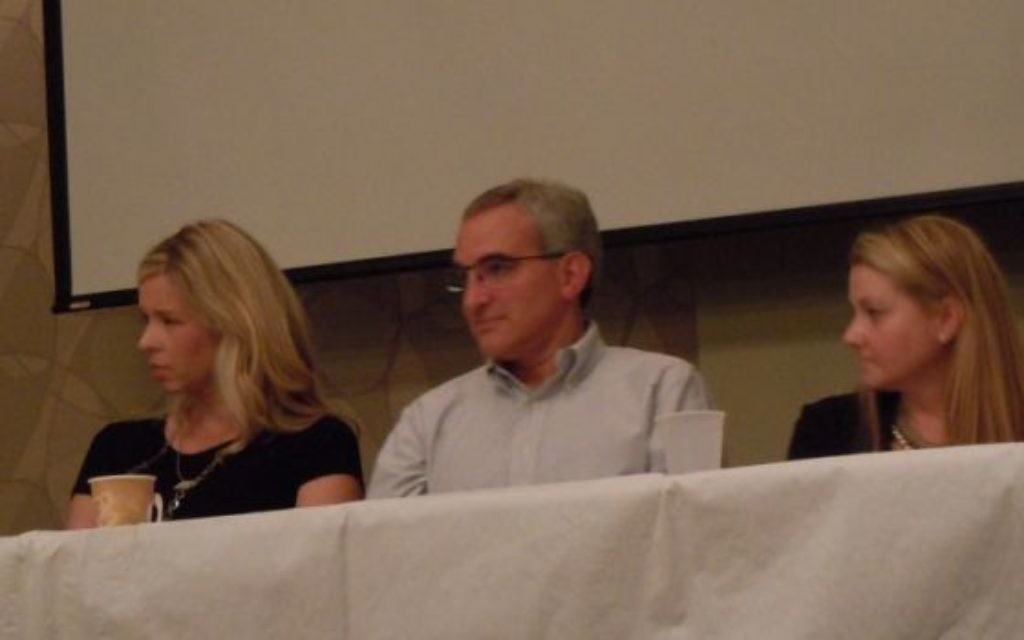WISH and Faith Fight Infertility
Support havurah’s panel of experts charts path to success
Daniel Shapiro, a physician who is a specialist in reproductive endocrinology and infertility at Reproductive Biology Associates in Sandy Springs, has three children after 28 years of marriage and never thought of himself as a fertility patient.
But as he told the inaugural communitywide meeting of the Wo/Men’s Infertility Support Havurah at Temple Sinai on Aug. 30, he and his obstetrician-gynecologist wife with each child experienced the same kinds of problems that become obstacles to many people trying to have children.
Get The AJT Newsletter by email and never miss our top stories Free Sign Up

They had no trouble getting pregnant and had a normal pregnancy through almost 34 weeks the first time when Shapiro’s wife suffered a placental abruption caused by a division in her uterus that she, Shapiro and their OB/GYN managed to miss.
If he and his wife hadn’t both been physicians, Shapiro said, they wouldn’t have reacted quickly enough, and their daughter would have died. As it was, she suffered severe oxygen deprivation and spent time in the neonatal intensive care unit; now she’s a senior at the University of Pennsylvania.
Their second child, a son, was a breach baby and could not be turned into the proper position for a natural birth.
After a break, they got greedy, Shapiro said, and decided to have a third child. Because the mother was going to be 38 at the birth, they had an amniocentesis at 17 weeks, and they lost the fetus. They lost three more pregnancies before having their third child.
Shapiro’s point: “There are so many things that can go wrong when you’re trying to family-build.”
The point of the WISH program, called “From If to When,” was that you don’t have to suffer alone or in silence if you’re among the one in six Jewish couples who struggle with infertility issues.
Infertility is a growing issue in part because people are waiting longer to try to have children, and a woman’s eggs have an expiration date, Shapiro said.
“This group is a place of comfort,” said Jaime Gimpelson Ackerman, who moderated the panel discussion and said that after being pregnant six times in four years, she has one son and is still trying for a second child.
Radio personality Jenn Hobby, whose second child arrived about two weeks after the WISH event, said it’s easy to let egos get in the way of seeking help and to be afraid of learning the truth about problems, but knowledge is power.
She drew a lot of nods when she expressed frustration about people continually asking her how the effort to get pregnant was going, or advising her just to relax and maybe go on vacation, or saying, “My husband just looks at me, and I get pregnant.”
Hobby joined Ackerman in endorsing acupuncture and advised keeping the faith and staying positive because the stress involved in the process makes pregnancy tougher.

“We invented stress. The Catholics learned it from us,” Shapiro said.
“If you want a family, there is a way to get there,” Hobby said. Some just take more time and money than others.
Lynn Holland Goldman said her own fertility issues led her to practice law in two of the expensive, legally complicated ways: adoption and surrogacy. She said adoption can cost $8,000 to $50,000, depending on whether you go through the foster system, an agency or a foreign adoption. The expenses for surrogacy can top $90,000.
Fertility testing and treatments also are expensive, Shapiro said, but a new testing platform that’s coming soon will cut the cost of pre-implantation genetic testing by 80 percent to about $1,000.
The good news, Shapiro said, is that success usually comes from seeking help with fertility issues. “Most people who come into our clinic eventually get what they want.”
—
WISH plans to meet monthly, alternating between educational sessions like the one Aug. 30 and group support sessions. Each meeting will be at 7 p.m. at Temple Sinai, 5645 Dupree Drive, Sandy Springs. The schedule: Oct. 15, Nov. 12, Dec. 3, Jan. 14, Feb. 18, March 10, April 21 and May 26.





comments